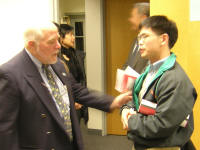The Community Colleges in China Project was conceived as a way of introducing American community college concepts to China. It was felt that community colleges were both great engines of mass higher education, nimble promoters of new technologies and spurs to local economic development, just the things needed and wanted by a China making the transition from planned to market economy.
Simultaneously, the Ford Foundation was seeking international projects to allow them to enter the area of higher education systems, not just supporting institutions or scholars. For some years Ford had been promoting grants to community colleges in the US as both escalators to four year institutions and creative forces to deal with poverty in minority areas. Eight Chinese institutions of higher education in Taiyuan, Shanghai and Beijing — two actually calling themselves “community colleges” — and the Ministry of Education (unofficially) seemed ready, willing and able to partner with the US-China Education Foundation in carrying out the project.

All the stars and planets seemed to be in alignment. But the project, launched with much idealism, was quickly embroiled in almost every conceivable American and Chinese political and cultural contradiction. Although it went on to do what Ford had funded it to do, it fell far short of the hopes and expectations of the instigators. A catalogue of its conflicts illustrates the perils, not only of promoting cross-cultural change and exchange — the US government bombed the Belgrade embassy of the People’s Republic two months before the project was to begin officially — but of discovering the tensions within the Chinese education system itself: tensions between one region and another, between public and private institutions, partisans of vocational-technical education vs. community college education that included liberal arts, the hopes of reformers vs. the “learned helplessness” of administrators and faculty who were used to taking (even though chafing at) directives from the Ministry, etc.
And beneath it all, despite the apparent mass benefit and payoff of a community college education for graduates and local businesses, there was the constant striving by students and parents, faculty and administrators for something with greater prestige, the “prestige chase,” that made even the word “community” (she qu) in “community college” (she qu xue yuan) a word of opprobrium. Elitist Confucian attitudes and practices toward education apparently did not die in 1949 or 1978 or 1999. But can the demands of a booming, modernizing economy and a system racing to stay ahead of unemployment tolerate such attitudes and practices in its higher education?


